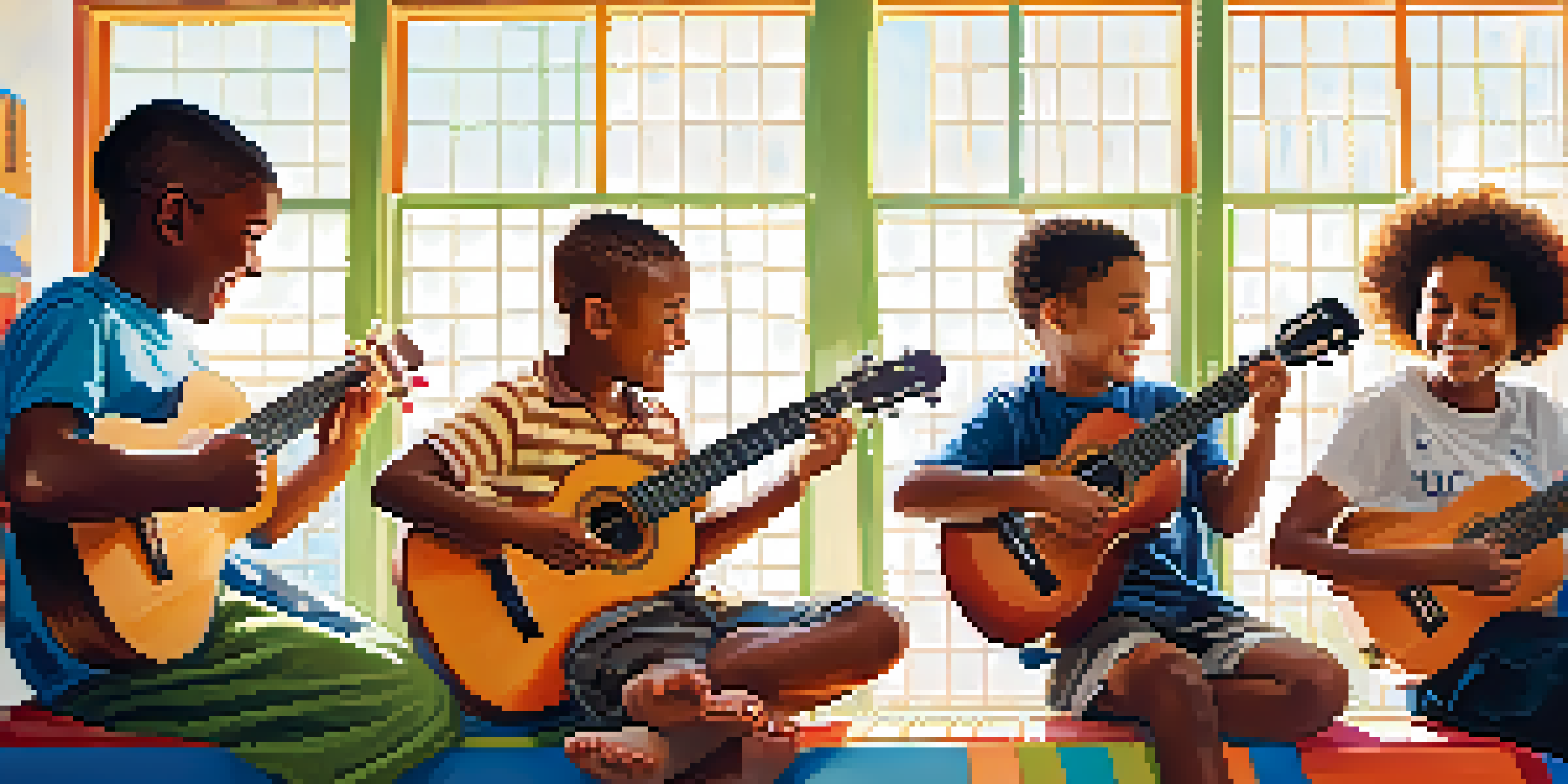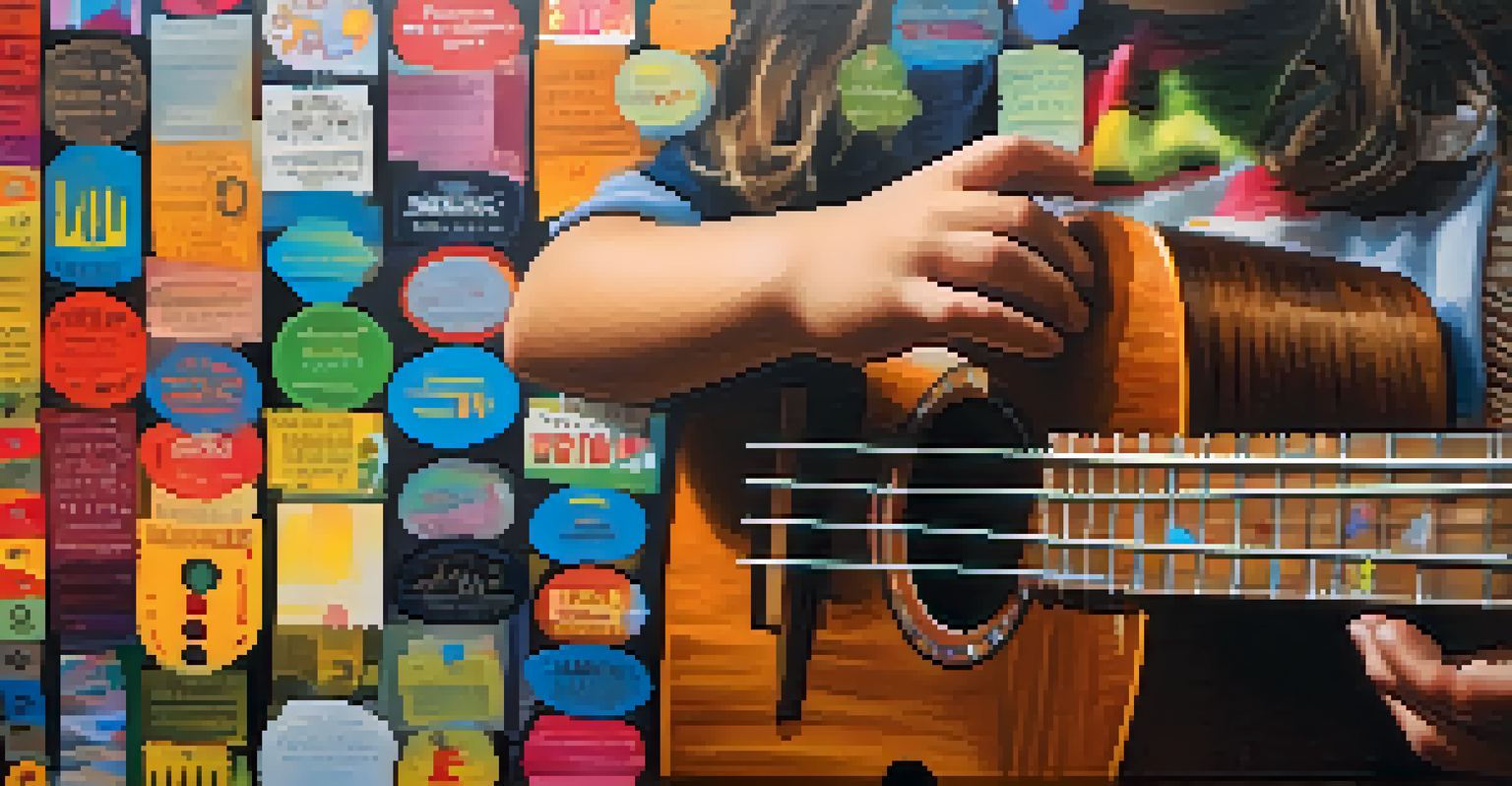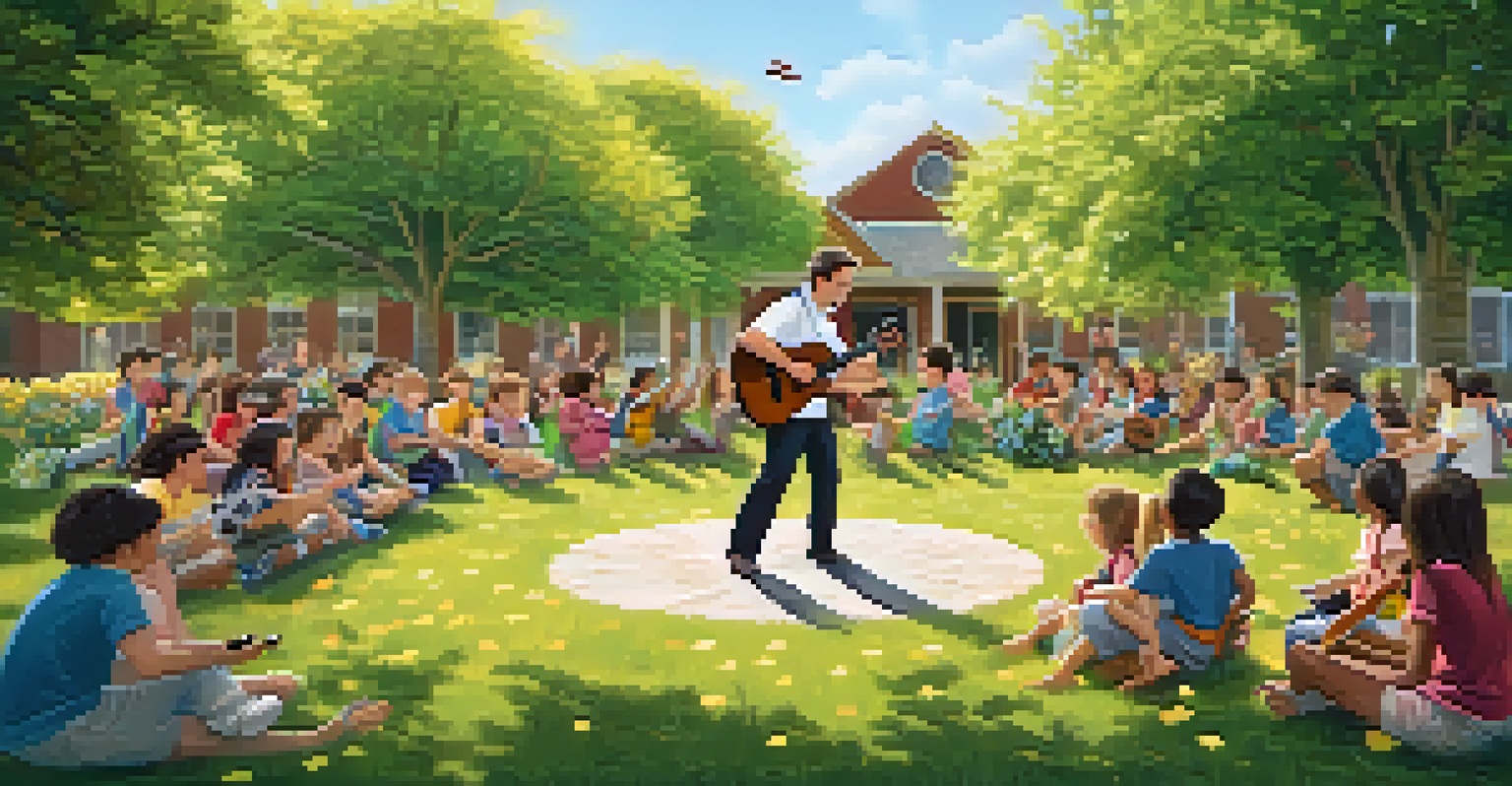Benefits of Ukulele Learning in Diverse Classroom Settings

Enhancing Creativity Through Ukulele Learning
Learning to play the ukulele can spark creativity in students, providing a unique outlet for self-expression. When children strum their first chords, they often feel a sense of achievement and joy, which can boost their confidence. This creative engagement encourages students to think outside the box, not just musically, but in all areas of learning.
Music can change the world because it can change people.
In a diverse classroom, where students come from various backgrounds, the ukulele serves as a common ground. It allows students to share their musical influences and styles, fostering a collective creativity that celebrates differences. This collaborative spirit can lead to innovative projects and performances that reflect the unique contributions of each student.
Moreover, incorporating music into learning can make lessons more engaging. By allowing students to create their own songs or adapt existing ones, teachers can enhance the educational experience, making it more dynamic and memorable. This approach not only nurtures creativity but also encourages teamwork and collaboration among peers.
Promoting Social Skills and Teamwork
Playing the ukulele in a group setting naturally encourages social interaction among students. As they learn to play together, they develop essential social skills such as communication, cooperation, and empathy. This environment fosters friendships and helps students feel more connected to their peers.

In diverse classrooms, the ukulele acts as a bridge, allowing students who might not typically interact to collaborate on musical projects. Group activities, like ensemble playing, require students to listen to one another and work towards a common goal. This teamwork can help break down social barriers and create a more inclusive atmosphere.
Boosts Creativity and Expression
Learning the ukulele sparks creativity in students, providing a joyful outlet for self-expression and collaboration.
Furthermore, sharing the experience of learning an instrument can deepen mutual respect among classmates. As students support each other through challenges and celebrate successes, they build a sense of community that extends beyond the music room. These social bonds can have a lasting impact on their overall classroom experience.
Improving Cognitive Skills through Music Learning
Research shows that learning to play an instrument can enhance cognitive abilities, such as memory and problem-solving skills. The ukulele, with its simple chord structure, is an excellent starting point for students of all ages. As they learn to read music and play melodies, they engage their brains in new and exciting ways.
The beautiful thing about learning is that no one can take it away from you.
In diverse classroom settings, this cognitive boost can benefit all students, regardless of their backgrounds. The skills gained through ukulele learning can translate to improved focus and academic performance across various subjects. For instance, the discipline required to practice regularly can instill a strong work ethic in young learners.
Additionally, music education can enhance language skills, as students learn to associate lyrics with melodies. This connection helps with vocabulary acquisition and comprehension, making ukulele learning a valuable tool for language development in diverse classrooms. Ultimately, the cognitive benefits extend far beyond music, positively influencing students' overall academic journey.
Fostering Emotional Well-being through Music
Learning to play the ukulele can be a therapeutic experience for students, providing an emotional outlet for expression. Music has the power to evoke feelings, and for many, playing an instrument can serve as a form of stress relief. This is especially crucial in diverse classrooms where students might face various challenges in their personal lives.
Moreover, the act of creating music can boost students' self-esteem. As they progress and master new skills, they develop a sense of accomplishment that can enhance their emotional well-being. Celebrating these milestones in a supportive classroom environment reinforces positive feelings and encourages resilience.
Enhances Social Skills and Teamwork
Playing the ukulele in groups fosters essential social skills, cooperation, and empathy among students.
In addition, the ukulele can help students process emotions and experiences, serving as a tool for reflection. By writing songs or improvising melodies, they can navigate their feelings in a constructive way. This emotional connection to music can foster empathy and understanding among classmates, creating a more compassionate learning environment.
Encouraging Cultural Awareness and Appreciation
The ukulele has roots in Hawaiian culture, and learning to play it can introduce students to diverse musical traditions. In a multicultural classroom, teachers can use the ukulele to explore various genres, encouraging students to appreciate different cultural perspectives. This exploration promotes respect and understanding among peers.
As students share their own musical backgrounds, the classroom becomes a rich tapestry of cultural exchange. Incorporating songs from around the world not only broadens students' musical horizons but also fosters a sense of pride in their heritage. This collaborative approach encourages students to celebrate their uniqueness while fostering inclusivity.
Additionally, projects centered around the ukulele can provide opportunities for students to conduct research and presentations on different cultures. This hands-on learning experience encourages curiosity and engagement, allowing students to connect with the material on a deeper level. Ultimately, ukulele learning can play a significant role in promoting cultural awareness in diverse classroom settings.
Facilitating Diverse Learning Styles and Needs
One of the great advantages of the ukulele is its accessibility; it caters to various learning styles and needs. Whether a student is a visual learner who benefits from seeing chord diagrams or an auditory learner who excels at listening, the ukulele can meet them where they are. This adaptability makes it a fantastic tool for inclusive education.
In diverse classrooms, some students may struggle with traditional learning methods or require additional support. The ukulele’s simple structure allows for differentiated instruction, enabling teachers to tailor lessons to individual needs. This flexibility ensures that all students can engage with the material and experience success.
Supports Diverse Learning Needs
The ukulele's accessibility caters to various learning styles, making it an effective tool for inclusive education.
Furthermore, group learning with the ukulele can foster peer-to-peer teaching, where students support one another in their learning journeys. This collaborative approach not only builds confidence but also reinforces the idea that everyone has unique strengths to contribute. Ultimately, this inclusivity can lead to a more harmonious classroom environment.
Encouraging Lifelong Learning and Passion for Music
Introducing students to the ukulele can ignite a passion for music that lasts a lifetime. As they learn the basics, many students find themselves wanting to explore further, whether by taking up additional instruments or diving deeper into music theory. This enthusiasm can lead to a lifelong appreciation for the arts.
In a diverse classroom, students can inspire each other to pursue their musical interests, creating a vibrant community of learners. Sharing different musical styles and preferences can motivate peers to experiment with their own creativity, fostering a culture of exploration and innovation. This collaborative spirit can be a catalyst for personal growth.

Moreover, the skills learned through ukulele playing can translate to other areas of life, encouraging students to approach challenges with curiosity and resilience. The mindset developed in music education can benefit them in academics, relationships, and future careers. Ultimately, the journey of learning the ukulele can serve as a gateway to a world of possibilities.